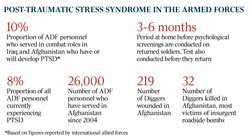ANZAC Day and PTSD
I’m struck when watching coverage of various ANZAC day ceremonies each year, how much is made of physical suffering, and how little of the mental scars that accompany war.
It’s also not just enlisted personnel who suffer. Civilian support staff, local civilians, and those close to sufferers are also directly affected.
 Post Traumatic Stress Disorder (PTSD) is broadly defined by the European Society for Traumatic Stress Studies as a condition that “Arises as a delayed or protracted response to a stressful event or situation (of either brief or long duration) of an exceptionally threatening or catastrophic nature, which is likely to cause pervasive distress in almost anyone.”
Post Traumatic Stress Disorder (PTSD) is broadly defined by the European Society for Traumatic Stress Studies as a condition that “Arises as a delayed or protracted response to a stressful event or situation (of either brief or long duration) of an exceptionally threatening or catastrophic nature, which is likely to cause pervasive distress in almost anyone.”
It is generally characterised by flashbacks, nightmares, emotional numbness and distance, hypervigilence, and insomnia. For some, angry outbursts can be common. Anxiety and depression are often a part of this complex response that humans have to extreme trauma.The Australian Defence Force reported in 2010 that just over 8% of personnel suffer from PTSD, a number likely to be significantly under-representative of the real situation as many ADF personnel are unwilling to disclose their trauma. The ADF also reports that personnel have almost double the rate of suicidal ideation (thoughts of suicide) as the general Australian community (although actual suicide rates are similar.) How many of those are suffering PTSD and simply feeling unable to report their situation?
There are a variety of methods to assist people to resolve PTSD. Narrative Therapy can be of enormous assistance to sufferers and those close to them, as therapy often succeeds in placing the trauma outside the individual, enabling the individual to construct a meaningful new dialogue around the trauma and the events that led to it.
The way people suffering from PTSD live their lives is generally not the way they would like to live their lives. Living in a way that is opposite your values – being angry with your wife, husband, partner or children, being emotionally distant, not being the fun and interesting person you used to be – is very distressing. Narrative Therapy generally assists in re-authoring lives, taking a person’s cherished values into account, with the aim of helping them live their lives in the way they prefer.
Theatres of war scar many more people mentally than are maimed or killed physically. Soldiers, their families, civilians in the way – indeed whole societies can be scarred. At some point, I hope that the increasingly overwhelming evidence of the psychological cost of war proves to be so expensive, both morally, and in terms of compensation, that engaging in it becomes repugnant.
If you are seeking help for yourself, for someone close to you, or you would like support as you support someone else, please contact us in your local area.
Additional crisis support is available at Lifeline on 13 11 14. The Department of Veterans Affairs also operates an information portal for veterans and their friends and families called At Ease.
Chris Mehl
Menstuff
 Follow
Follow